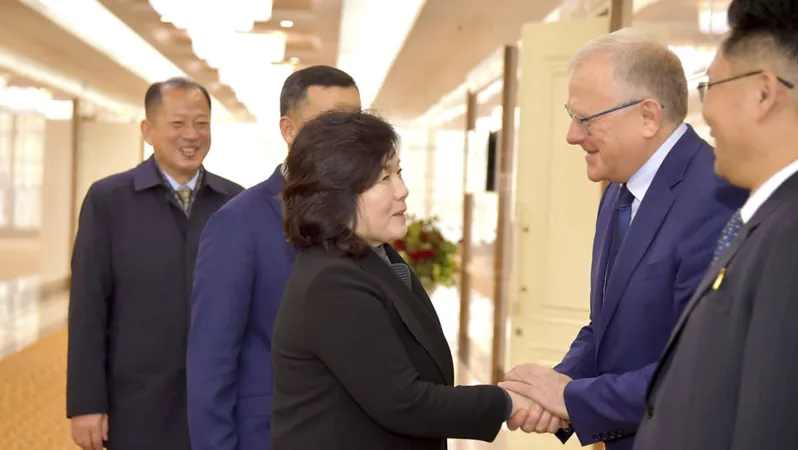
Shocking Alliance: North Korea Joins Forces with Russia Amid Escalating Ukraine War
2024-10-29
Author: Sarah
Introduction
In a significant development that could reshape international dynamics, North Korea's foreign minister, Choe Son Hui, made a surprise visit to Russia on October 29. As the Russia-Ukraine conflict intensifies, NATO and South Korea expressed growing concerns over the potential deployment of North Korean troops alongside Russian forces.
NATO's Alarm
NATO reported alarming intelligence indicating that thousands of North Korean soldiers are being mobilized toward the front lines, prompting Ukraine to urgently request more military aid and an international strategy to counter this new threat. Two U.S. officials confirmed the presence of North Korean soldiers in Russia's Kursk region, a border area that has experienced significant Ukrainian military action.
U.S. Response
The Biden administration has made it clear that if North Korean troops engage in combat, they would be considered legitimate targets for Ukrainian strikes. The U.S. has also indicated that it will not impose additional restrictions on Ukraine's use of its military assistance should North Korean forces enter the fray.
South Korea's Concerns
Meanwhile, South Korea, still technically in a state of war with North Korea since the Korean War of 1950-1953, voiced strong condemnation of this troop movement. Seoul is particularly wary of what military technology or resources Russia might share with Pyongyang in return.
Choe's Visit
During her visit, Choe's itinerary remained unclear, and President Vladimir Putin reportedly has no plans to meet her. Ukrainian President Volodymyr Zelenskyy, following discussions with South Korean President Yoon Suk Yeol, characterized these developments as heralding a new phase in the Ukraine conflict. He warned that the war is expanding beyond the two original nations involved.
Warnings from South Korea
As tensions rise, South Korea's Yoon declared that if North Korea receives military assistance from Russia, it could endanger South Korea’s national security, leading to discussions about potential arms supplies to Ukraine if this situation escalates further. Crucially, Putin has not denied reports of North Korean troop presence in Russia.
A Move Beyond Symbolism?
The exact role that North Korean troops may play in the war remains uncertain. Analysts from the Center for Strategic and International Studies (CSIS) noted that while the troop numbers might suggest a substantial contribution, their impact may be limited to support roles, constituting a mere fraction of Russia's overall military force. However, this alliance could still signify a strategic maneuver by both nations, showcasing their growing ties against a backdrop of shared interests, especially regarding U.S. relations.
Dual Purpose of North Korean Involvement
Several experts suggest that North Korea's involvement might serve a dual purpose—not only addressing Russia's manpower shortages as it faces a protracted conflict but also enhancing Moscow's geopolitical leverage against both U.S. allies and China.
Training and Collaboration
As the ongoing war, initiated by Russia's invasion in February 2022, continues to demand significant resources and has resulted in devastating casualties, the Pentagon's estimates indicate that training for North Korean troops has escalated dramatically. Reports suggest that the number of North Korean soldiers in eastern Russia rose from 3,000 to approximately 10,000—underlining the urgency of military collaboration between these two isolated regimes.
Deepening Military Cooperation
Furthermore, it has been revealed that Russian military forces are instructing North Korean soldiers in essential military terminologies, aimed at enhancing their operational effectiveness. Concurrently, Russia is reportedly offering technical support for North Korea’s satellite program, indicating a deepening military cooperation that could have long-term implications for regional security.
Conclusion
As North Korea continues to supply Russia with critical military hardware—such as short-range ballistic missiles and artillery shells—both nations seem poised to solidify their alliance, presenting a formidable challenge to geopolitical stability in the broader region. The world is watching closely as these developments unfold, uncertain of the profound implications this may have on the Ukraine conflict and beyond.

 Brasil (PT)
Brasil (PT)
 Canada (EN)
Canada (EN)
 Chile (ES)
Chile (ES)
 España (ES)
España (ES)
 France (FR)
France (FR)
 Hong Kong (EN)
Hong Kong (EN)
 Italia (IT)
Italia (IT)
 日本 (JA)
日本 (JA)
 Magyarország (HU)
Magyarország (HU)
 Norge (NO)
Norge (NO)
 Polska (PL)
Polska (PL)
 Schweiz (DE)
Schweiz (DE)
 Singapore (EN)
Singapore (EN)
 Sverige (SV)
Sverige (SV)
 Suomi (FI)
Suomi (FI)
 Türkiye (TR)
Türkiye (TR)